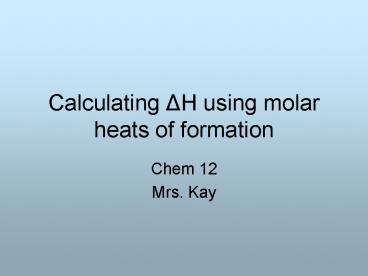Calculating ?H using molar heats of formation - PowerPoint PPT Presentation
1 / 11
Title:
Calculating ?H using molar heats of formation
Description:
Calculating H using molar heats of formation Chem 12 Mrs. Kay You want only one mole of the product being formed. Look up the Hf on the table H2 + S + 2O2 H2SO4 ... – PowerPoint PPT presentation
Number of Views:84
Avg rating:3.0/5.0
Title: Calculating ?H using molar heats of formation
1
Calculating ?H using molar heats of formation
- Chem 12
- Mrs. Kay
2
- If 1 mol of compound is formed from its
constituent elements, then the enthalpy change
for the reaction is called the enthalpy of
formation, ?Hof . - Standard conditions (standard state) 1 atm and
25 oC (298 K). - Standard enthalpy of formation 1 mol of compound
is formed from substances in their standard
states.
3
- Examples write formation reactions for each
- Remember the compounds are formed directly from
their elements. - H2SO4
- NH4Cl
4
- You want only one mole of the product being
formed. - Look up the ?Hf on the table
- H2 S 2O2 ? H2SO4 ?H -814 kJ/ mol
- 2. ½ N2 2H2 ½ Cl2 ? NH4Cl
- ?H -314.4 kJ/ mol
5
Enthalpies of Formation
6
- Using Enthalpies of Formation for Calculating
Enthalpies of Reaction - For a reaction
7
- By definition, the enthalpy of formation of an
element in its standard state is zero. - Example, oxygen (O2) and chlorine (Cl2) both
have ?Hof of zero.
8
Sample Problem 1
- Calculate ?H for the following reaction using
standard molar heats of formation, ?Hf . - 2NH3(g) 3Cl2(g) ? N2(g) 6HCl(g)
- ?H ?
9
- ?Hf for NH3(g) -45.9 kJ/mol
- ?Hf for HCl(g) -92.3 kJ/mol
- ?Hf for Cl2(g) and N2(g) is 0
- ?H S n?Hf(product) - S n?Hf(reactant)
- ?H (0 6(-92.3 kJ)) - (2(-45.9 kJ) 0)
- (-553 kJ) - (-91.8 kJ)
- -461.2 kJ
10
- Examples
- Use the tables in the back of your book to
calculate ?H for the following reactions - 4 CuO (s) ? 2 Cu2O (s) O2 (g)
- C3H8 (g) 5 O2 (g) ? 3 CO2 (g) 4 H2O (l)
- NH3 (g) HCl (g) ? NH4Cl (s)
11
Practice
- Page 685 15
- Page 687 19-21
- Page 691 5































